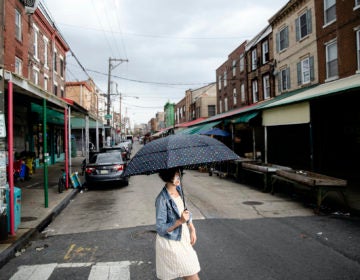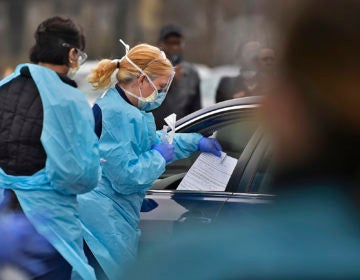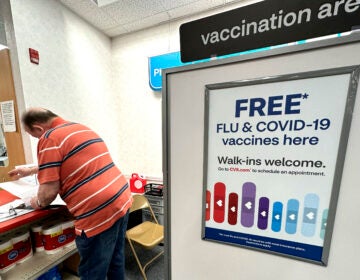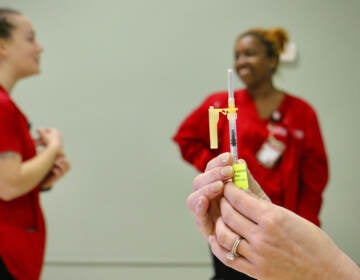Coronavirus update: N.J. to release ‘low-risk’ prisoners
The move is meant to protect people whose age or health status puts them at risk of life-threatening complications while behind bars from COVID-19.
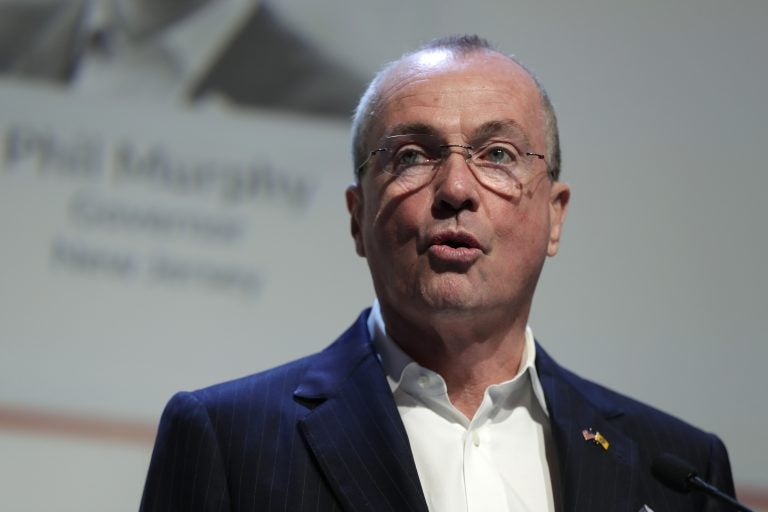
New Jersey Gov. Phil Murphy (Julio Cortez/AP Photo, File)
Are you on the front lines of the coronavirus? Help us report on the pandemic.
New Jersey officials reported another 3,627 cases of coronavirus cases on Friday, with the state’s total now at 54,588.
Gov. Phil Murphy also said another 233 people have died, bringing the state’s total number of fatalities to 1,932.
N.J. to send some ‘low-risk’ prisoners home
New Jersey will begin to release “low-risk” people from state prisons whose age or health status puts them at risk of life-threatening complications from COVID-19, Murphy said Friday.
The announcement came after officials reported an unidentified state prisoner had died from the virus — the first known instance in the state — and paid tribute to Corrections Officer Nelson Perdomo, 44, who also passed away this week after contracting the disease.
Murphy said his decision is modeled after similar steps taken in California and Illinois, as well as at the federal level, to address concerns that the close quarters at correctional facilities can be a breeding ground for the virus.
New Jersey already moved last month to release up to 1,000 people from county jails.
BREAKING: I’m signing an Executive Order to help balance the needs of public safety and public health.
Under this order, certain-low risk individuals may be placed on temporary home confinement or granted parole if already eligible through an expedited process. pic.twitter.com/7QwAddh4GD
— Governor Phil Murphy (@GovMurphy) April 10, 2020
Officials said Friday they didn’t have a precise count of how many of the state’s roughly 18,500 prisoners the new order would affect. State data indicate that at least 129 Department of Corrections employees and 20 prisoners have tested positive for COVID-19.
The prisoner who died was being housed at New Jersey State Prison in Trenton, officials said, while Perdomo worked at East Jersey State Prison in Rahway.
At least one other New Jersey corrections officer has also succumbed to the virus: Bernard Waddell Sr., 56, who worked in the Hudson County jail.
Murphy imposed the policy change through an executive order, whose text was not immediately available.
But the Democrat said the order sets up a process by which older prisoners and those with underlying health conditions can be granted temporary home confinement or parole. Those who have been denied parole in the last year or whose sentences are set to expire within the next three months are also eligible for release pending approval by a special review board.
Prisoners deemed unsafe to their communities, or those don’t have access to housing or medical services outside of state custody, will not be released, Murphy said.
“I want to stress that no one convicted of a serious crime, such as murder, sexual assault, among others, will be eligible for consideration,” he said, adding anyone released will remain subject to Department of Corrections supervision.
“Social distancing is extremely hard to accomplish in a prison setting,” he continued, “and allowing some of our most vulnerable individuals who do not pose a public safety threat to temporarily leave prison will protect both their health and the health and safety of the men and women working in our correctional facilities.”
Releases could begin within the next week.
Prior to Friday, advocacy groups had been clamoring for more aggressive action to protect incarcerated individuals.
On March 31, Amol Sinha, head of the New Jersey chapter of the American Civil Liberties Union, sent a memo to the governor outlining options to rapidly reduce the prison population and included a dire warning.
“A failure to significantly reduce the prison population in this moment means that people will die,” he said. “Every day that we do not move with urgency concerning those living or working in prisons is another day that lives are put at risk.”
On Friday, Sinha called Murphy’s executive order “a strong first step” but encouraged further action to protect those prisoners not affected by the new policy.
Also Friday, state Corrections Commissioner Marcus Hicks laid out other steps his department has taken to protect those serving time and working in prisons.
The department has suspended family visits, limited recreation and communal dining, as well as forced anyone entering a corrections facility to undergo a health screening and wear a surgical mask.
Prisoners displaying COVID-19 symptoms and all employees must also wear masks, Hicks said. Anyone who has come into contact with people confirmed to have the virus has been quarantined. That now includes about 400 prisoners and more than 1,000 employees, he said.
‘Glimmers of hope’
New Jersey is starting to see some “glimmers of hope” that its social distancing policies are having their intended effect, Murphy said Friday.
Maps the governor started displaying at his daily coronavirus briefings this week indicate that the rate at which overall COVID-19 cases are expected to double is slowing in many counties.
The expected doubling rate in Bergen County, for instance, slowed on Friday to a week or more — down from five to seven days on Thursday.
Other hard-hit counties in North and Central Jersey are seeing similar trends.
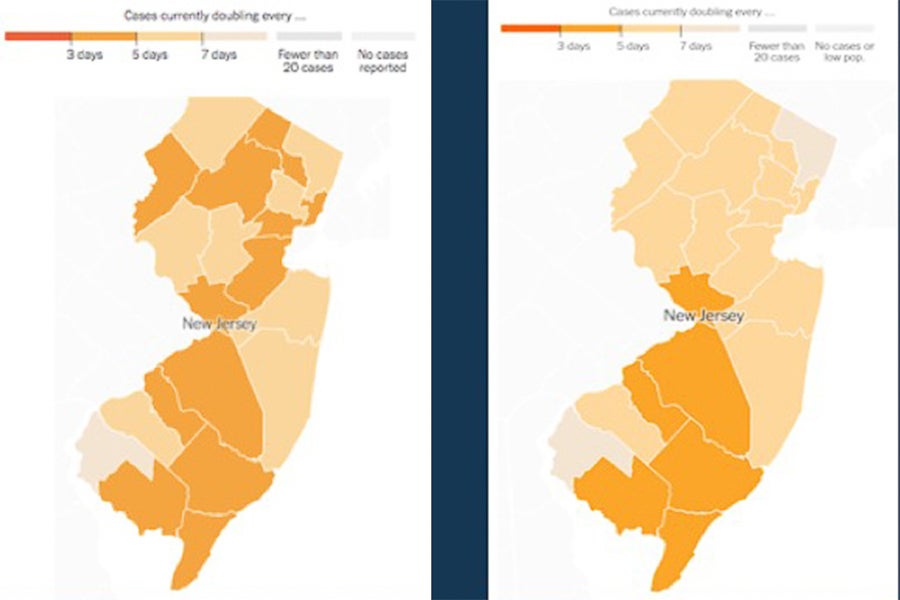
Meanwhile, Murphy said the number of new cases reported each day is starting to level off. Health Commissioner Judith Persichilli said hospitals should have sufficient bed space to accomodate a surge of patients anticipated in the next few days.
Some hospitals are still diverting patients to other facilities, she said, but that’s now primarily due to staffing constraints, not bed space.
“Workforce is tight right now,” she said.
Murphy also celebrated that 682 people had been discharged from hospitals in the last 24 hours but warned it’s not yet time to “let our foot off the gas” in terms of social distancing — especially during Passover and over Easter weekend when many families would otherwise be getting together.
“We have to keep with it today, tomorrow, Sunday and everyday until this war is won,” he said. “And win it we will.”
WHYY is your source for fact-based, in-depth journalism and information. As a nonprofit organization, we rely on financial support from readers like you. Please give today.


